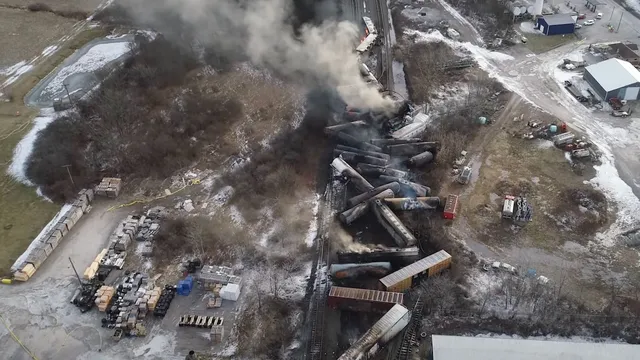
Norfolk Southern to pay $600 million after deadly train derailment
2025-04-24 17:13- A jury ruled that Norfolk Southern must pay a total of $600 million to residents affected by the Ohio train derailment.
- Previously, GATX was found not liable for the settlement even though it owned the derailed train car.
- The case highlights ongoing legal issues and concerns about Norfolk Southern's response to the derailment disaster.
Express your sentiment!
Insights
In February 2023, a train derailment occurred in East Palestine, Ohio, spilling hazardous chemicals and igniting a significant fire, which necessitated the evacuation of nearby residents. Following this incident, a jury concluded that Norfolk Southern, the operating railroad company, is required to pay a full $600 million settlement to residents affected by the disaster. The jury also determined that GATX, the company that owned the railcar that derailed, bears no responsibility for the settlement costs despite the catastrophic outcome. The subsequent release and incineration of toxic chemicals from the train's derailed tank cars raised concerns regarding the necessity of such actions and was deemed to be the result of miscommunication about the associated risks by Norfolk Southern and its contractors, according to the National Transportation Safety Board in June 2024. Legal actions continued, as a lawsuit was filed in February 2025, claiming that the mishandling of cleanup efforts by Norfolk Southern and its contractors resulted in fatalities. Earlier, in January, a $22 million settlement was reached to address claims from the village of East Palestine, which was intended for projects related to the train derailment, with some funds already allocated. Norfolk Southern has committed to monitoring drinking water and providing medical examinations for community members as part of its ongoing financial responsibilities related to the disaster.
Contexts
The Norfolk Southern train derailment in Ohio in 2023 was a significant incident that raised concerns about rail safety and emergency response protocols. On the night of February 3, 2023, a freight train carrying hazardous materials derailed in East Palestine, a small village in northeastern Ohio. The incident resulted in the release of toxic chemicals, compelling local authorities to declare a state of emergency and evacuate residents from the surrounding areas. The response involved not only local emergency services but also coordination with federal agencies such as the Environmental Protection Agency and the National Transportation Safety Board to assess the situation and manage the aftermath effectively. The derailment's impact on the community was profound, with numerous residents expressing concerns about health risks associated with the environmental contamination. The released substances included vinyl chloride, a carcinogenic gas, which raised alarms about potential long-term effects on the local population and ecosystem. Norfolk Southern faced public scrutiny regarding its handling of the aftermath, including the communication efforts to inform residents about safety measures and the potential health implications of the derailment. In response, the company engaged in several initiatives aimed at rebuilding trust, including providing resources for affected residents and funding local support services. In the wake of the derailment, investigations were launched to determine the cause and evaluate the safety standards of the rail industry. The NTSB conducted a thorough analysis of the train's mechanical condition and its adherence to safety protocols. Preliminary findings suggested issues related to the train's braking system and the maintenance practices employed by the railroad company. As investigations continue, key stakeholders have emphasized the urgent need for stricter regulatory oversight and enhanced safety measures to prevent similar incidents in the future. This event has sparked broader discussions about the transportation of hazardous materials by rail and the necessary precautions to safeguard communities along rail lines. In summary, the Norfolk Southern train derailment in Ohio highlighted critical issues related to rail safety, emergency response, and community health. The incident served as a wake-up call for the rail industry, regulatory agencies, and local governments to prioritize safety and environmental protection. As the situation evolves and investigations lead to new findings, the affected community will likely remain vigilant about the long-term implications of the derailment on their health and the environment, seeking accountability and improvements in safety measures to ensure such tragedies do not recur.